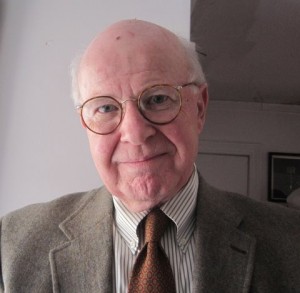Could the difficulties associated with the academic conceptualisation of “religion” be overcome by changing our focus instead to “the sacred”? Jay Demerath tells Chris why we should define religion substantively – that is, in terms of specific attributes like rituals, deities or dogmas – but the sacred in terms of the function it serves in the lives of individuals and cultures. From this perspective, religion can be considered one of a number of potential sources of the sacred.
Jay Demerath is currently the Emile Durkheim Distinguished Professor of Sociology Emeritus at the University of Massachusetts, Amherst, where he has been a faculty member since 1972, including ten years as Chair. Prior to UMass, he received a 1958 A.B. from Harvard and a 1964 Ph.D from the U. Of California, Berkeley before rising from Instructor to Professor at the University of Wisconsin, Madison and serving as Executive Officer of the American Sociological Association. Among his many publications, he is author or editor of fourteen books, including the award-winning Crossing the Gods: World Religions and Worldly Politics (2001) and the recent Sage Handbook for the Sociology of Religion (2008). The current Chair-elect of the Religion Section of the American Sociological Association, he is also past-President of the Eastern Sociological Society, the Society for the Scientific Study of Religion, and the Association for the Sociology of Religion.
Of particular relevance to this interview is his paper from 2000, The Varieties of Sacred Experience: Finding the Sacred in a Secular Grove, from the Journal for the Scientific Study of Religion, 39, p. 1–11. Here’s the abstract:
This paper contends that the social scientific study of religion has long labored under a chafing constraint and a misleading premise. It suggests that our primary focus should be on the sacred, and that religion is just one among many possible sources of the sacred. Defining religion “substantively” but the sacred “functionally” helps toresolve a long-standing tension in the field. Broadened conceptions of the sacred and of “sacralization” help to defuse the conflict among the two very different versions of secularization theory: the “all-or-nothing” versus the “middle range.” Meanwhile, a conceptual typology of the sacred pivots around the intersections of two distinctions (compensatory vs. confirmatory and marginal vs. institutional). This generates four distinct scenarios: the sacred as integrative, the sacred as quest, the sacred as collectivity, and the sacred as counter-culture. The paper concludes with three admonitions for research in the area.









